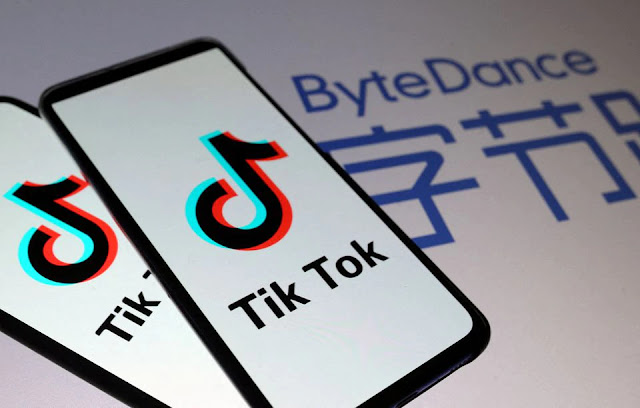 |
| Tik Tok logos are seen on smartphones in front of a displayed ByteDance logo in this illustration taken November 27, 2019. REUTERS/Dado Ruvic/Illustration/File Photo |
TikTok owner ByteDance saw its revenue grow 70% year on year to about $58 billion in 2021, slower growth than a year earlier as China tightens its regulation of big tech companies.
According to two people familiar with the matter the numbers were revealed to a small group of employees at an internal meeting of the social media giant this week .
In 2020, the Beijing-based company's total revenue grew by over 100% to $34.3 billion, Reuters has reported. ByteDance did not immediately respond to a request for comment.
Chinese tech companies from Tencent to Alibaba have reported slowing growth amid a sweeping crackdown by the country's regulators, who have rolled out new rules for how they operate and interact with their users.
According to a recent report by market research firm Interactive Marketing Lab Zhongguancun,
ByteDance held its second position in China's online advertising market last year with a 21% market share.
The number one position was still held by e-commerce giant Alibaba Group (9988.HK), and third place went to gaming giant Tencent Holdings (0700.HK), according to the report.
The overall growth of online ad sales in China declined to 9.3% in 2021 from 13.8% a year earlier, the report says.
Tech news website The Information last November reported that ByteDance's 2021 revenue was on track to rise about 60% to 400 billion yuan ($63.07 billion).
ByteDance is one of the world's biggest private tech companies with recent trades in the private-equity secondary market valuing it at about $300 billion, Reuters has reported.
Following Beijing's antitrust efforts, ByteDance has recently been downsizing its powerful investment arm. read more
In November, ByteDance reorganised itself into six business units in its biggest organizational change since ByteDance founder Zhang Yiming said in May he would step down as CEO.
Besides TikTok, ByteDance's other apps include its Chinese equivalent Douyin, news aggregator Jinri Toutiao and video-streaming platform Xigua.
In 2021, users spent approximately $2.3 billion in TikTok and the iOS version of Douyin, a 77% jump year-over-year, according to app tracker Sensor Tower.
source https://techncruncher.blogspot.com/2022/01/exclusive-tiktok-owner-bytedances.html
Comments
Post a Comment